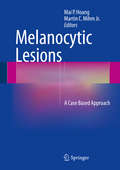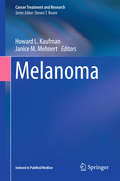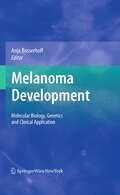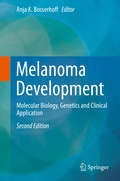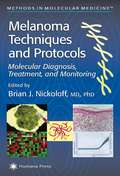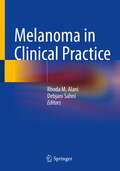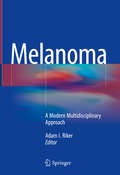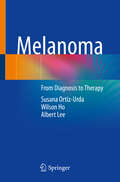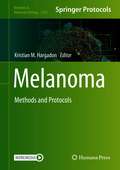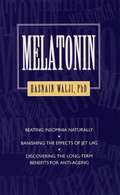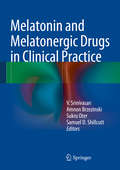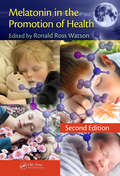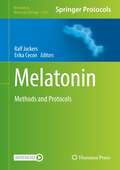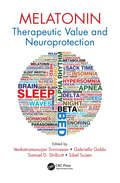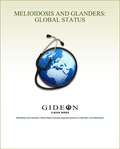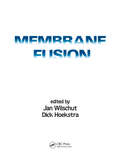- Table View
- List View
Melanin Chemistry Explored by Quantum Mechanics: Investigations for Mechanism Identification and Reaction Design
by Hideaki Kasai Ryo Kishida Susan Meñez AsperaThis book discusses recent advances in theoretical–computational studies on the biosynthesis of melanin pigment (melanogenesis). These advances are being driven by the development of high-performance computers, new experimental findings, and extensive work on medical applications involving the control of pigmentation and the treatment of challenging dermatological diseases. Understanding the elementary processes involved in chemical reactions at the atomic scale is important in biochemical reaction design for effective control of the pigmentary system. Accordingly, the book focuses on the elementary steps involved in melanogenesis, which crucially affect the composition of the resulting melanin pigment by means of competitive reactions. The book also addresses reactions analogous to melanogenesis, with a focus on o-quinone reactions, which are especially important for understanding melanogenesis-associated cytotoxicity.
Melanin-Concentrating Hormone and Sleep: Molecular, Functional And Clinical Aspects
by Jaime M. Monti S. R. Pandi-Perumal Pablo TorteroloThis book offers a compilation of papers on the role of melanin-concentrating hormone (MCH) in sleep, sleep disorders and neuroendocrine functions. Leading experts in sleep medicine, psychiatry and neuroendocrinology provide a broad perspective on the field, from the anatomical structure and physiology of the MCH system to the connection with other systems influencing sleep and diseases like anxiety and depression. The potential of MCHR-1 antagonists as anxiolytic/antidepressant drugs is also reviewed. The book will represent an interdisciplinary guide for sleep disorder specialists, sleep researchers, psychiatrists, neurologists, psychologists, and behavioral sleep medicine specialists.
Melanocytic Lesions
by Martin C. Mihm Mai P. HoangMelanocytic Lesions: A Case Based Approach provides a concise yet comprehensive guideline on how to diagnose common as well as problematic and challenging melanocytic lesions. In the first 11 chapters, each entity is illustrated by an actual case; followed by discussion of how the diagnosis is reached, of the histologic differential diagnoses and of diagnostic pitfalls and ends with bulleted teaching points Pertinent and up to date references are included at the end of each chapter. The latter chapters cover current microstaging and classification of melanoma, ancillary techniques including immunohistochemistry as well as available molecular assays and molecular targeted therapy. All figures and glass slides of the discussed cases are hosted online for easy viewing and access. Melanocytic Lesions: A Case Based Approach will serves as a useful resource for pathologists, dermatologists and researchers dealing with melanocytic lesions.
Melanoma
by Howard L. Kaufman Janice M. MehnertMelanoma is one of the most types of cancer. When melanoma is detected at an early stage, treatment is highly successful, but outcomes can be poor when the disease is advanced. There has been significant progress in our understanding of the molecular biology, genetics, and immunology of melanoma over the past decade. This has been accompanied by rapid advances in therapeutic strategies for patients with melanoma. This book provides the clinician and the researcher with a broad understanding of the molecular and cellular pathogenesis of melanoma, explores the clinical characteristics and criteria for clinical and pathological staging of the disease, and provides an overview of current and evolving treatment strategies in the adjuvant, metastatic, and preventive settings. The treatment of special populations and rare variants of melanoma that often present particular clinical challenges is also covered. Authored by international experts in melanoma biology and clinical management, this volume concisely explains how to diagnose, treat, and prevent melanoma while reviewing advances in basic science and providing an overview of innovative approaches still under development.
Melanoma Development
by Anja BosserhoffThe book provides comprehensive insights into molecular changes in malignant melanoma. The general mechanisms of melanoma growth and development are described, as well as new research findings. Our current knowledge on the molecules involved in cell transformation and tumor progression will soon lead to sophisticated, targeted therapies. Recent studies with targeted b-RAF inhibitors have given us grounds to hope that these therapies will be successful. Melanoma Development- Molecular Biology, Genetics and Clinical Application aims to contribute to this knowledge. Summarizing the newest data and presenting upcoming research areas in the field, the book will be of great interest to basic researchers and physicians working in the important fields of melanoma, cancer research, therapy and dermatology.
Melanoma Development
by Anja K. BosserhoffThis book focuses on malignant melanoma, discussing the current state of scientific knowledge and providing insights into the underlying basic mechanisms, the molecular changes, genetics and genomics. Human Melanoma is a dangerous type of skin cancer affecting an increasing population, and a better understanding of its development will help in finding sophisticated targeted therapies. The second revised edition features the latest research findings and offers updates on the latest advances and potential novel melanoma therapies. It is a valuable resource for researchers and clinicians working in the fields of melanoma, cancer research and therapy as well as dermatology.
Melanoma Techniques and Protocols
by Brian J. NickoloffIn Melanoma Techniques and Protocols: Molecular Diagnosis, Treatment, and Monitoring, a broadly diverse group of researchers and clinicians offer not only reviews of the most important recent advances in melanoma oncology, tumor immunology, and pathology, but also state-of-the-art molecular techniques for probing its basic biology. These readily reproducible methods can be used to develop new diagnostic approaches, therapeutics, and status monitoring of patients suffering both early- and late-stage melanoma. With emphasis on the experimental details critical to experimental success, each method is described in step-by-step fahion by hands-on masters, often those who have developed hem in their own laboratories. Comprehensive and highly instructive, Melanoma Techniques and Protocols: Molecular Diagnosis, Treatment, and Monitoring offers both clinicians and basic scientists concerned with malignant melanoma both new clinical perspectives and the wide ranging experimental protocols essential for achieving more rapid breakthroughs in this near-epidemic disease.
Melanoma in Clinical Practice
by Rhoda M. Alani Debjani SahniThis book provides a concise practical guide to melanoma enabling the reader to develop a thorough understanding of the etiology, pathogenesis, diagnosis, treatment and prevention of melanoma. It features easy to digest instructional text that describes a variety of techniques for detecting and staging melanoma including total body photography. Surgical, radiation and systemic therapy treatment options as well as prevention strategies are also covered.Melanoma in Clinical Practice represents a thorough guide on how to diagnose treat and prevent melanoma, and provides a valuable resource for the trainee and experienced clinical dermatologists who are seeking a reference guide to use in their clinical practice.
Melanoma: A Modern Multidisciplinary Approach
by Adam I. RikerThis text serves as a very useful clinical guide and realistic approach to the clinical management of melanoma. Primary care physicians, specialists from varying areas of medical practice and numerous other healthcare providers will find this text to be quite useful as a standard daily reference and use in the office setting. It provides a clear and concise source of information in order to make real-life, evidence-based decisions for all aspects of management for cutaneous melanoma. This book also provides the latest breakthroughs in melanoma research, ranging from recent discoveries in genomics and epigenetics, to newly identified genes that have been selectively targeted for the development of a personalized approach to treatment. All chapters are written by specialists and true experts within their respective fields, incorporating the latest scientific, clinical and evidence-based medicine for melanoma (and non-melanoma skin cancers). This up-to-date information can be easily applied and translated to the clinical setting for the melanoma patient.
Melanoma: From Diagnosis to Therapy
by Albert Lee Susana Ortiz-Urda Wilson HoThis book aims to provide more nuanced diagnostic information beyond the standard ABCDEs of melanoma diagnosis to help screen atypical presentations alongside common presentations. By providing up-to-date diagnosis, staging, and therapy information with an emphasis on dermoscopy, this unique guide provides what longer, more comprenhensive texts cannot - a succinct and concise educaitonal guide for ease of use. While there are other longer references regarding melanoma, this book attempts to provide only essential information for optimal usability across disciplines. Though small in size, the book is comprehensive in its coverage, offering chapters on staging and diagnosis while going more in depth on chapters covering melanoma in childhood and during pregnancy. Images are primarily sourced from actual patients through extensive use of the dermatoscope to get the highest definition photo available. Melanoma - From Diagnosis to Therapy is a valuable resource for practicing dermatologists and residents as well as practitioners who work in general clinical settings and patients looking for a more detailed understanding of the disease.
Melanoma: Methods and Protocols (Methods in Molecular Biology #2265)
by Kristian M. HargadonThis extensive book brings together leading melanoma researchers from across the world and highlights many of the cutting-edge protocols and experimental systems currently being used to investigate questions surrounding this disease. The volume opens with sections on 2D and 3D cell culture-based approaches for studying melanoma biology, and continues with collections of chapters examining various approaches for detecting, isolating, and characterizing circulating melanoma cells, circulating tumor DNA, and exosomes, as well as experimental procedures for studying and detecting melanoma metastasis in both pre-clinical and clinical settings, bioinformatics-based approaches, protocols for quantifying and characterizing immune cell infiltrates in both melanoma tumors and tertiary lymphoid structures, and development and evaluation of therapeutic strategies for melanoma treatment. Written in the highly successful Methods in Molecular Biology series format, chapters include introductions to their respective topics, lists of the necessary materials and reagents, step-by-step, readily reproducible laboratory protocols, and tips on troubleshooting and avoiding known pitfalls. Authoritative and comprehensive, Melanoma: Methods and Protocols aims to serve basic research scientists and clinicians who bring questions from the clinic into the lab in order to translate observations in the laboratory into improved patient care for this highly malignant form of cancer.Chapter 14 is available open access under a Creative Commons Attribution 4.0 International License via link.springer.com.
Melanoma: Translational Research and Emerging Therapies (Translational Medicine Ser. #Vol. 8)
by Sanjiv S. Agarwala Vernon K. SondakAssembling, reviewing, and synthesizing state-of-the-art information on translational research and therapies of melanoma into one convenient source, Melanoma: Translational Research and Emerging Therapies provides clinicians and researchers the necessary context and perspective to intergrate and effectively deploy cutting-edge therapies into daily
Melasma and Vitiligo in Brown Skin
by Evangeline B. Handog Maria Juliet Enriquez-MacarayoThis book sheds new light on pigmentary disorders in people with brown skin. Brown skin encompasses many races and ethnicities. Due to migration, people with brown skin are seen almost everywhere in the world. A wide variety of pigmentary disorders exists among this population but the most disturbing and challenging are melasma and vitiligo This book covers these two disorders, among people of brown skin, from the epidemiology to management, in a detailed yet easy-to-read and easy-to-use style.
Melatonin and Melatonergic Drugs in Clinical Practice
by V. Srinivasan Amnon Brzezinski Sukru Oter Samuel D. ShillcuttThe book aims to cover basic physiologic functions of melatonin, and its therapeutic applications in humans for a variety of clinically relevant disorders. This book contains chapters on the recent aspects of melatonin physiology, its receptors and their role in mitochondrial function, its immunomodulatory role and importance in seasonal dependent diseases, role in human reproduction, role in sleep, circadian rhythm and sleep disorders, role in neurologic disorders such as Parkinson's disease, Alzheimer's disease. Additionally, melatonin's therapeutic use in neurobehavioral disorders in children, migraine and tension headache is also covered in this book. Melatonin's antioxidant role in Duchenne's muscular dystrophy and in glaucoma have also been discussed in short chapters. Two major melatonin agonists, ramelteon and agomelatine are discussed extensively on their current clinical application and ongoing research. Two chapters on agomelatonin and its role in mood disorders, particularly depressive disorders, are an important feature of this book. The chapters are written by experts from the global academia recognized for their original research and published work in the field of melatonin science.
Melatonin in the Promotion of Health
by Ronald Ross WatsonMelatonin is a powerful hormone and antioxidant with numerous effects on the metabolism and the health of humans. This volume provides a wide variety of expert reviews on the biology of melatonin relevant to health. Beginning with a history of melatonin and its relation to circadian rhythms, the book examines its use in a host of applications, including gastrointestinal diseases, anesthesia and surgery, bone health, breast cancer, cardiovascular diseases, diabetes, and age-related macular degeneration and uveitis. It also examines applications related to melanoma, solar skin damage, collagen synthesis, the prevention of DNA damage, mental disorders, sleep, and issues related to jet lag and shift work.
Melatonin, Neuroprotective Agents and Antidepressant Therapy
by Francisco López-Muñoz Venkataramanujam Srinivasan Domenico De Berardis Cecilio Álamo Takahiro A. KatoThis work is a guidebook for clinicians who are involved in treating depressive patients and also serves the research scientists who are working on the psychopharmacological mechanisms of antidepressant actions and psychopathological mechanisms underlying mood disorders. Mood disorders such as major depressive disorder (MDD), bipolar disorder (BPD) and seasonal affective disorder (SAD) are the most disabling disorders that are among the most expensive of all medical illnesses. The pathophysiology of mood disorders is very complex and involves many mechanisms like circadian rhythm disruption, sleep abnormalities, melatonin rhythm abnormalities and alterations in melatonin receptor mechanisms, abnormalities in monoaminergic neurotransmitter mechanisms, glutamatergic release mechanisms, hippocampal neurogenesis, and abnormal immune and cytokine release mechanisms. Many antidepressants that are in clinical use today including the recently introduced novel agents like agomelatine or other antidepressants cause clinical remission by resynchronizing disrupted circadian rhythms and melatonin receptor functions, enhancing monoaminergic neurotransmission, promoting hippocampal neurogenesis, and regulating immune mechanisms. This book explains various etiological factors that are involved in the pathogenesis of mood disorders and the mechanisms of therapeutic actions of antidepressants including the recently introduced agomelatine and other antidepressants that exhibit rapid onset of action with greater efficacy and fewer side effects. .
Melatonin: Methods and Protocols (Methods in Molecular Biology #2550)
by Ralf Jockers Erika CeconThis volume covers the latest techniques that study the synthesis of melatonin, its receptor function, and its effects at the cellular and systemic level. The chapters are organized into three parts. Part One describes methods for the detection of melatonin and its biological derivatives in various biological samples, the manipulation of melatonin synthesis by the pineal gland in animals, and the principal source of melatonin in mammals. Part Two explores methods to measure the biological effects and consequences of melatonin binding to high-affinity G protein-coupled receptors. Part Three describes methods to measure the physiological effects that are regulated by melatonin in animals, particularly in rodent models. Written in the highly successful Methods in Molecular Biology series format, chapters include introductions to their respective topics, lists of the necessary materials and reagents, step-by-step, readily reproducible laboratory protocols, and tips on troubleshooting and avoiding known pitfalls.Cutting-edge and thorough, Melatonin: Methods and Protocols is a valuable resource for any researcher interested in investigating melatonin, from its production to its mechanisms of action and systemic effects.
Melatonin: Therapeutic Value and Neuroprotection
by Samuel D. Shillcutt Venkatramanujan Srinivasan Gabriella Gobbi Sibel SuzenThere is growing interest in the field of melatonin research regarding its neurobiological mechanisms as well as its repercussions in clinical practice. Melatonin: Therapeutic Value and Neuroprotection explores melatonin's neuroprotective effects and discusses the therapeutic potential of melatonin and melatonin agonists in treating neurodegenerati
Melioidosis and Glanders: Global Status 2010 edition
by Dr Stephen Berger Gideon InformaticsMelioidosis and Glanders: Global Status is one in a series of GIDEON ebooks which summarize the status of individual infectious diseases, in every country of the world. Data are based on the GIDEON database (www.gideononline.com) which relies on standard text books, peer-review journals, Health Ministry reports and ProMED, supplemented by an ongoing search of the medical literature. Chapters are arranged alphabetically, by country name. Each section is divided into six subsections. 1. Descriptive epidemiology 2. Summary of clinical features 3. Global status of the disease4. Potential use in Bioterrorism 5. Status of the disease in a specific country 6. References Melioidosis and Glanders: Global Status includes separate sections on Glanders, and Melioidosis.
Melt Extrusion
by Michael A. Repka Nigel Langley James DinunzioThis volume provides readers with the basic principles and fundamentals of extrusion technology and a detailed description of the practical applications of a variety of extrusion processes, including various pharma grade extruders. In addition, the downstream production of films, pellets and tablets, for example, for oral and other delivery routes, are presented and discussed utilizing melt extrusion. This book is the first of its kind that discusses extensively the well-developed science of extrusion technology as applied to pharmaceutical drug product development and manufacturing. By covering a wide range of relevant topics, the text brings together all technical information necessary to develop and market pharmaceutical dosage forms that meet current quality and regulatory requirements. As extrusion technology continues to be refined further, usage of extruder systems and the array of applications will continue to expand, but the core technologies will remain the same.
Melting the Surgeon's Heart
by Becky WicksCan the new search and rescue paramedic break through the brooding surgeon&’s icy barriers? Escape on an Icelandic adventure with Becky Wicks&’s latest Harlequin Medical Romance to find out! CAN SHE THAW HIS FROZEN HEART? Haunted by his father&’s infamous financial crimes, renal surgeon Gunnar Johansson has sworn off marriage and children. He won&’t subject anyone else to an entire country&’s scorn! Isolating himself, he volunteers for Reykjavik&’s search and rescue. But new paramedic Mahlia is a temptation he never saw coming! Soon her warmth and courage when battling Iceland&’s harshest elements—and her own painful past—threaten to melt his icy resolve…From Harlequin Medical: Life and love in the world of modern medicine.
Melting the Trauma Doc's Heart: From Heartache To Forever (yoxburgh Park Hospital) / Melting The Trauma Doc's Heart (Harlequin Lp Medical Ser.)
by Alison RobertsHe ran away from his past…Is she a reason to stop running?Trauma doctor Zac Cameron escaped the horrors of the battlefield and settled in a small community hospital. He’s just about coping until an unexpected visitor—renowned surgeon Dr. Olivia Donaldson—whirls into town. She might be his boss’s estranged daughter, but their chemistry’s instant—and irresistible! Yet Zac’s emotions are completely off-limits, unless Olivia’s the one who can thaw his frozen heart…?“I read this in one sitting. This was such a heart-felt story. I loved the characters.The author really did a fantastic job…. I highly recommend this story to anyone. It was a real treat to read.”— Goodreads on Pregnant with Her Best Friend’s Baby“This had a little bit of everything, dipping its toes into fairytale waters and bringing a Cinderella-like feel…. And Alison Roberts balances everything pretty-much perfectly bringing an uplifting romance between two endearing characters which simply leaves your heart sighing happily.”—Goodreads on Their Newborn Baby Gift
Membrane Abnormalities In Hypertension (Routledge Revivals #1)
by Chiu-Yin KwanFirst Published in 1989, this two-volume set offers a full insight into membrane abnormalities during a state of hypertension. Carefully compiled and filled with diagrams, references and information this set is recommended for students of medicine and other professionals in their respective fields.
Membrane Fusion
by Jan WilschutThis balanced volume provides a broad and coherent overview of recent progress in membrane fusion research—highlighting an interdisciplinary treatment of the subject from the fields of biophysics, biochemistry, cell biology, virology, and biotechnology—in a single volume., Featuring easy-access sections on the general properties of membranes and applications of membrane fusion techniques, this valuable sourcebook outlines membrane structure, lipid polymorphism, and intermembrane forces ... covers membrane fusion in model systems ... presents the fusogenic properties of enveloped viruses ... discusses the fusion and flow of intracellular membranes and cell-cell fusion occurring during fertilization and myogenesis ... offers applications of membrane fusion techniques in cell-biological research and biotechnology ... and more. Supplying a comprehensive view of this exciting topic, Membrane Fusion is a working resource for molecular, cell, and membrane biologists; biophysicists; biochemists; virologists; biotechnologists; microbiologists; immunologists; physiologists; and graduate and medical school students in biophysics, biochemistry, physiology, virology, cell biology, and biotechnology.


